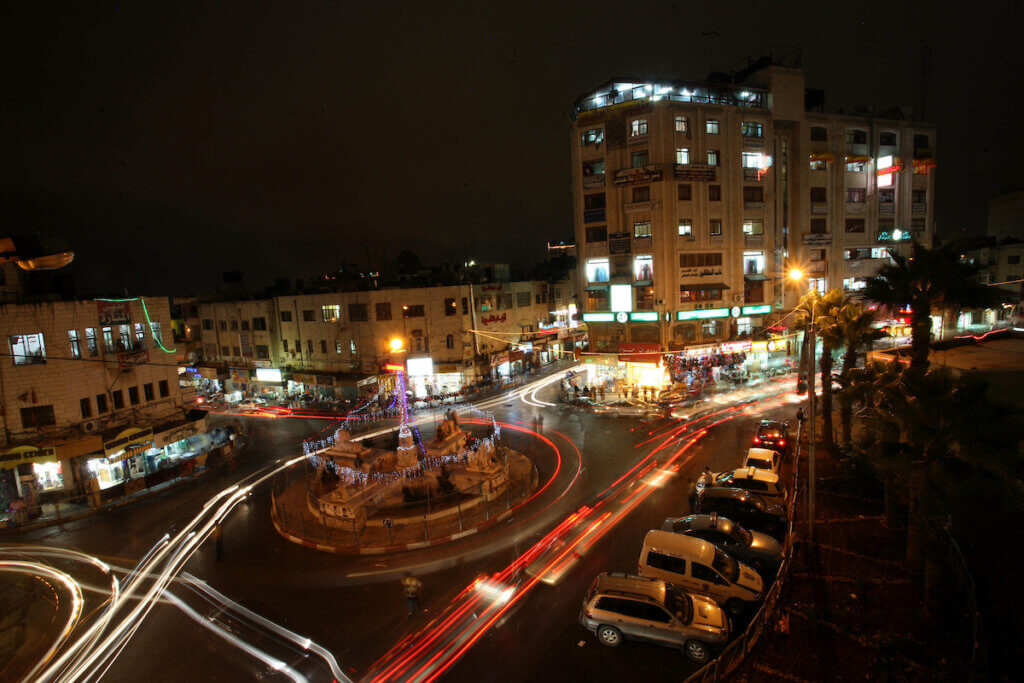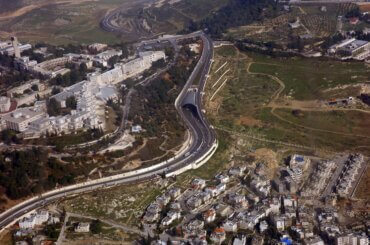FUGITIVE DREAMS
Chronicles of Occupation and Resistance
by Ramsey Hanan
408 pp. Fomite Press, $18.95
Describing the Palestinian experience has long been the purview of seasoned political scientists, artists, and lawyers — rarely are Palestinian scientists at the forefront of narrating our stories. That is why I was enthused when Ramsey Hanan, an old schoolmate from Ramallah, contacted me earlier this year to inform me that he had quit his full-time job as a successful professor of physics to become an author. His first book, Fugitive Dreams: Chronicles of Occupation and Resistance (due out October 4), is a deeply personal memoir that intricately weaves together a quintessentially Palestinian academic’s journey, complete with a tapestry of emotions that encompass sadness, anger, guilt, longing, hope (or sometimes, hopelessness), and the ultimate question of belonging, through the eyes of a fictionalized version of himself named “Sameer Zeitoun.”
Hanhan belongs to a generation of Palestinians born some years after the 1967 War, when Israel occupied East Jerusalem (his birthplace) along with the West Bank and Gaza Strip, and who came of age just in time to remember life before the 1987 uprising (commonly known as the “First Intifada” although Hanhan argues it was actually the only Intifada).
Reading the first few chapters of Fugitive Dreams brought back vivid memories of my own formative years (I am approximately a year younger than the author), including the times we were able to drive freely throughout historic Palestine (albeit lacking civil rights) until Israel’s gradual imposition of draconian caging measures that not only began with the Intifada but accelerated during the so-called “peace process” that followed.
Hanhan clearly portrays these life-changing times with a captivating innocence while simultaneously reminiscing about otherwise typical childhood experiences such as being roughed up by a neighborhood bully, having a crush on a neighbor (and on a Soviet gymnast competing in the 1988 Seoul Olympics), and the agony of being “shortchanged” because our high school in Ramallah did not become co-ed until his junior year (which he attributes to “a crude system that paid homage to a repressive culture of segregating the sexes, one that we students resented”).
In vividly describing his childhood, including family road trips throughout Palestine, complete with the names of routes taken, and reliving the incidents that represented the gradual tightening of the noose of the occupation, Hanhan constructs a powerful retort to the much-peddled smear that Palestinians are “taught to hate.” After he masterfully pieces together the events that appeared designed by Israel to instill obedience through terror within an occupied Palestinian population that yearned to live free — including violent beatings, nightly raids on homes, and forced school closures — Hanhan’s Sameer finally addresses this “absurd idea”:
My parents never taught me to hate anyone, and I can’t imagine other parents doing so. Neither did my teachers, who were protective of us, incite me to violence, as some pro-occupation “nonprofits” claimed our schools to be doing…If anyone were taught to hate Israel, the lessons were handed down directly, by order of the Israeli military governor.
The later chapters of Fugitive Dreams deal with Sameer’s reluctant move from Palestine to the United States to attend university, later settling there while returning frequently to Ramallah in the (ultimately abandoned) hope of one day moving back, a personal dilemma with which I can closely relate. Sameer intimately portrays the relationships developed with fellow students and pro-Palestine activists during his university years as well as with professional colleagues (including, inevitably, those who were Zionist) once he became a professor. However, the most poignant pages in these chapters are those that describe Sameer’s periodic visits to Palestine, especially after his daughter Ksenya was born.
On one hand, the relative freedom of movement he was accustomed to as a child had disappeared in favor of the dreaded permit system, and Sameer catalogs the obstacles he was required to surmount to obtain checkpoint-crossing permits from the Israeli military during his short stays; sometimes they would be granted for only a day, sometimes longer. Even obtaining an Israeli visa for his Chinese-born wife was prescient given Israel’s restrictions on foreign spouses of Palestinians that are in place today:
After inspecting her application, the embassy official blankly informed us that it would likely be denied. When we asked why, she explained matter-of-factly, “for the reason that she is married to a Palestinian”. Apparently they take pride in discrimination. To get her visa, Charlene returned to the embassy alone, wearing a big cross, and posing as a tourist interested in Jerusalem’s holy places. It worked.
On the other hand, Sameer’s distress at the changing face of Ramallah on each visit is palpable, as the open hills he used to frequent as a child gradually disappeared to make way for noisy construction projects and the intervening “mounds of trash” that plagued the city and countryside. Moreover, the people had become far more “on edge, short on tempers, bullying each other, [and] wearing a captive prison mentality – a collective suicide in slow motion”. If much of the book is about the hardships and “suffocation” of being a Palestinian under Israel’s boot, Hanhan nevertheless devotes a significant part of the text to addressing his own people’s blemishes, as when Sameer recounts a recent conversation with an old friend:
[Waheed] surprised me, when we got to the social ills of our society — the trash, the corruption, etc. — by saying that these were “secondary problems that we can solve when Palestine is free”. I bluntly told him my opinion: if our society is like this, our society can never be liberated. How can we organize a campaign for freedom when we can’t organize our trash disposal? Even more fundamentally, what right can we claim to a land that we apparently don’t respect? Our social ills are a reason Israel continues to win.
Hanhan’s analytical leanings as a scientist do not escape the reader given some rather unconventional touches that are evident throughout his writing. These are initially subtle (for example, he reasons through his hesitation to consider the events of 2000–2005 an “Intifada” and his insistence on referring to Israeli colonies on the West Bank as “stolenments” rather than “settlements”). Toward the end of the book, however, he lays out his view of Israel’s endgame (using Ariel Sharon’s policies as the primary exhibits for his case) as well as his own list of lessons and ideas that Palestinians ought to consider in response. Readers may find some of his statements agreeable, such as rejecting the two-state solution as politicians being “stuck in a labyrinth of partition plans” or stating that “the absurdity of the entire Zionist project is highlighted by this reality”: fully armored and equipped soldiers taking children for a mortal threat.” Other ideas may be more thought-provoking:
I began greeting the Israeli soldiers at the [Allenby] Bridge…I am rejecting the subordinate role they assigned me, asserting instead my place as an equal…In the face of their attempts to dehumanize me, my best means of resistance is to assert my humanity.
And of course, others still may be highly debatable, such as suggesting that murdered Israeli Prime Minister Yitzhak Rabin was, despite his history of brutality toward Palestinians, more willing to forge peace than were any of his successors.
“Even if Ramallah never changed, I did.”
Ramsey Hanhan
Despite establishing a career in the US, the ever-present tug of his Levantine homeland remains a constant and powerful force in Hanhan’s story. The anguish is palpable when he admits that he gradually “abandoned the idea of going ‘back’ anywhere…People can attempt to grasp a particular moment and hold on to it forever. As the COVID pandemic has taught us, that will never happen. Things always change. People always move, in time if not in space. So, even if Ramallah never changed, I did.” Still, I could not avoid the sense that leaving his professorship to become an author constitutes some sort of penance on his part, perhaps assuaging the “guilt” he feels for remaining outside of Palestine.
Fugitive Dreams is one of the few books that would make a compelling read even for those of us very familiar with the question of Palestine; the fact that I read most of it while on my own visit to Ramallah this summer made it ever more impressionable. While retelling a deeply familiar history, Hanhan articulates long-held sentiments many of us learned to bury, whether to adapt to life abroad or to merely survive under occupation at home. As such, I highly recommend Hanhan’s debut literary project.




“I am rejecting the subordinate role they assigned me, asserting instead my place as an equal…In the face of their attempts to dehumanize me, my best means of resistance is to assert my humanity.”
___________________________________________________________
The most powerful resistance is counter intuitive. Equality is the key.
He’s right about cleaning up the trash. You do what you can, and that is something Palestinians can do for themselves. (Also, the Jews sneer at them for it, like a cabdriver in Eilat did when I was there.) Saul Alinsky (Rules for Radicals) would agree. You do what you can to create the kind of society you want to live in.
Real change grows from below. From civil society, organized and unorganized. (That’s why Israel is hell-bent on destroying it.) I would liken it to baby teeth falling out when they are pushed out by the adult teeth growing underneath them.